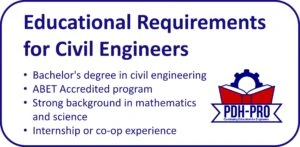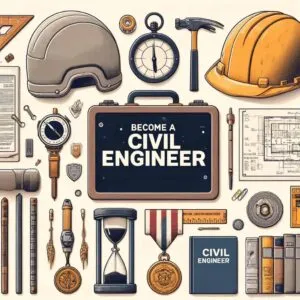How to Become a Civil Engineer: The Skills, Education, and Licensing You Need
Contributor: Jordan Ellis, PE
Written: Feb 13, 2020 | Updated: Nov 22, 2025
Engineers assume a diverse array of important roles in the world today. They help to design and create the structures in which people live, work, and play and the devices that they use every day. Every time you turn on the TV, use the microwave oven, or drive your vehicle, your life is impacted by the designs of engineers. Engineers shape the world.
To enter this vital profession, aspiring engineers must complete a rigorous educational path, develop key technical and interpersonal skills, and meet state licensing requirements. The process is demanding but rewarding—offering the opportunity to build a career that shapes the world we live in every day.
To become a civil engineer, you need a bachelor’s degree from an ABET-accredited program, strong skills in math and science, and a commitment to solving real-world infrastructure challenges. Civil engineers must pass the FE and PE exams, gain relevant work experience, and often specialize in fields like structural, environmental, or transportation engineering.
Below we discuss in more detail what civil engineers do, the kind of education they need, and how they become licensed in their field.
Related Articles:
What Does It Take to Become a Petroleum Engineer
How to Become a Structural Engineer in Virginia
What Do Civil Engineers Do?
Civil engineers are the creative problem-solvers behind the infrastructure that powers modern life. From highways and water systems to airports and city skylines, they design, build, and maintain the essential systems that keep communities functioning and growing.
Key Responsibilities:
-
Design and Planning: Civil engineers develop detailed blueprints for structures like bridges, buildings, roads, tunnels, and dams. They use advanced modeling software to evaluate safety, efficiency, and cost-effectiveness.
-
Site Assessment and Testing: Before construction begins, they analyze soil, rock, and groundwater conditions and perform site surveys to ensure the land is suitable for the proposed design.
-
Construction Oversight: Engineers often manage large teams and coordinate with architects, contractors, and regulatory agencies to ensure projects meet specifications and stay on schedule.
-
Sustainability and Resilience: Many modern civil engineers focus on climate resilience and environmental impact—designing flood control systems, green roofs, or energy-efficient transportation networks.
-
Maintenance and Inspections: Even after projects are complete, civil engineers may conduct structural inspections, oversee repairs, and ensure compliance with safety standards.
Real-World Example:
Think of the last bridge you crossed, the storm drain system protecting your neighborhood, or the transit hub in your city—chances are, a civil engineer played a key role in its design and construction.
Beyond the Build:
Civil engineers must balance innovation with practical constraints. They navigate:
-
Government regulations and permitting
-
Budget limitations and material costs
-
Geographic and environmental challenges
Through all stages of a project—planning, execution, and long-term maintenance—civil engineers act as stewards of public safety and sustainability.
Learn more about continuing education for licensed civil engineers.
Civil Engineering Specializations
Civil engineering is a broad field that includes multiple sub-disciplines, each addressing different aspects of infrastructure design, development, and maintenance. Understanding these specializations can help aspiring engineers identify areas of interest and align their education and experience with long-term career goals.
1. Structural Engineering
Structural engineers are responsible for the design and integrity of buildings, bridges, towers, and other load-bearing structures. They ensure that these structures can withstand environmental forces and human use while adhering to safety and building codes. This specialization requires a strong understanding of physics, materials science, and load analysis.
2. Transportation Engineering
Transportation engineers plan, design, and manage systems that move people and goods efficiently. This includes highways, airports, railways, and public transit systems. They also focus on traffic flow, safety analysis, and the impact of infrastructure on surrounding communities.
3. Geotechnical Engineering
Geotechnical engineers study soil, rock, and underground water to determine their suitability for construction projects. Their work is essential for designing foundations, retaining walls, tunnels, and earthworks. A deep understanding of soil mechanics and subsurface conditions is critical in this field.
4. Environmental Engineering
This specialization involves designing systems that protect and improve environmental quality. Environmental engineers develop water and wastewater treatment facilities, stormwater management systems, air pollution control strategies, and sustainable waste disposal methods.
5. Water Resources Engineering
Water resources engineers manage the movement, distribution, and quality of water. They design infrastructure such as dams, levees, canals, and stormwater systems to address issues related to flood control, water conservation, and distribution. This field is becoming increasingly important due to climate change and urban expansion.
6. Construction Engineering
Construction engineers focus on the planning and execution of infrastructure projects. They work closely with contractors, architects, and project managers to ensure that engineering designs are translated into built structures safely, on time, and within budget. This role often requires knowledge of cost estimating, scheduling software, and safety regulations.
How to Become a Civil Engineer – Educational Requirements for Civil Engineers
To become a licensed civil engineer, most professionals begin by earning a bachelor’s degree in civil engineering from an ABET-accredited program. These programs provide the technical foundation and hands-on experience required for professional licensure in most U.S. states.
Recommended High School Preparation
Students interested in civil engineering should begin developing strong skills in:
- Mathematics (Algebra II, Calculus, Geometry)
- Sciences (Physics, Chemistry)
- Technical courses (CAD, Engineering Design)
- Communication and writing
Extracurricular activities like STEM clubs, engineering summer camps, and science fairs are excellent ways to build experience and interest in the field. Engineering students generally report that civil engineering is an enjoyable major and report high satisfaction with their courses and professors.
Typical College Curriculum – Degree Program
A civil engineering degree program usually includes coursework in:
- Structural analysis and design
- Geotechnical engineering
- Fluid mechanics and hydrology
- Construction materials and methods
- Transportation systems
- Engineering economics and project management (specialty courses)
Students also complete lab work and often engage in internships or cooperative education (co-op) programs to gain real-world experience and certification.
Accreditation and Online Programs
When selecting a school, it’s critical to confirm that the program is accredited by ABET, as this is a requirement for sitting for the Fundamentals of Engineering (FE) exam and later becoming a licensed Professional Engineer (PE). While a few universities offer online components or hybrid options, most civil engineering degrees are primarily in-person due to the hands-on nature of lab and design courses. It is important to think about engineering certification while you’re an undergraduate to ensure you’ll have options down the road.
How to Become a Licensed Professional Civil Engineer
To practice as a professional civil engineer and take legal responsibility for engineering work, individuals must become licensed Professional Engineers (PEs). Licensure demonstrates a commitment to public safety, technical competence, and ethical practice.
In the United States, the licensure process typically includes the following steps:
1. Earn a Degree from an ABET-Accredited Program
Before anything else, you must complete a bachelor’s degree in civil engineering from a college accredited by the Accreditation Board for Engineering and Technology (ABET). This ensures the curriculum meets the standards required for licensure.
2. Pass the Fundamentals of Engineering (FE) Exam
Administered by the National Council of Examiners for Engineering and Surveying (NCEES), the FE exam is usually taken shortly before or after graduation. Upon passing, individuals earn the title Engineer-in-Training (EIT) or Engineering Intern (EI).
3. Gain Professional Work Experience
Most states require four years of qualifying work experience under the supervision of a licensed Professional Engineer. This period allows engineers to apply academic knowledge to real-world projects and develop the judgment needed for independent practice.
4. Pass the Principles and Practice of Engineering (PE) Exam
After completing the required experience, candidates can sit for the PE exam in civil engineering. This rigorous test assesses both general and discipline-specific knowledge and is the final hurdle to earning the PE license.
5. Maintain Licensure with Continuing Education
Once licensed, civil engineers must meet continuing professional competency (CPC) requirements, which vary by state. This often includes earning Professional Development Hours (PDHs) through courses, seminars, or webinars related to engineering practice and ethics.
The Civil Engineer’s Academic Path: From College to Master’s
The career foundation for every successful civil engineer is a high-quality education. While your journey begins with obtaining an engineering bachelor’s degree from an ABET-accredited college or university, your learning certainly doesn’t end there. The vast majority of civil engineers specialize immediately after graduation, and many choose to pursue an advanced degree.
Entering an engineering degree program as an engineering student is demanding, but it sets the stage for your future work. For those who wish to pursue research, academia, or highly specialized areas like geotechnical or coastal engineering, a master’s degree becomes essential. This advanced education allows you to focus on a particular specialty and dramatically deepens your theoretical skills. Ultimately, whether you stop at the bachelor’s level or continue to a master’s, your formal education is a prerequisite for achieving engineering certification and becoming a fully licensed professional engineer.
Job Outlook and Employment Projections: A Career Built to Last
Anyone looking at how to become a civil engineer should feel confident about the job outlook. Unlike many other fields, civil engineering is tied directly to necessity – the world will always need reliable infrastructure. Current employment projections show steady growth because the United States is currently facing a massive backlog of needed maintenance, replacement, and expansion projects.
The majority of jobs are in government (federal, state, and local agencies) and private consulting firms that execute those public projects. Securing early work experience through internships while still a student is critical for future employment. Your salary and potential pay in civil engineering directly correlate with your accumulated work experience and the certification level you achieve. A PE with a master’s degree and significant work leading major projects will always command top-tier compensation in the industry.
The Core Discipline: Engineering Design and Construction Skills
The heart of a civil engineer’s work is design and execution. This is where your skills translate directly into tangible reality. When we talk about civil engineering, we’re dealing with immense responsibility. Our engineering design must withstand environmental forces, support immense loads, and guarantee public safety.
This requires a unique blend of technical and practical skills.
For instance, a structural civil engineer must not only calculate the forces on a bridge, but must also understand the practical limits of construction. Similarly, a geotechnical civil engineer design. Success in this field requires constantly honing your ability to solve complex design problems and efficiently manage multi-faceted construction projects
Becoming a Civil Engineer: Step-by-Step Guide
Becoming a civil engineer typically requires a civil engineering bachelor degree from an accredited program. Most civil engineering education requirements include math, physics, structural analysis, and design coursework.
Here are the top 7 steps to earn a civil engineering career:
-
Earn a bachelor’s degree in civil engineering or a related field.
-
Complete required coursework in math, physics, and engineering fundamentals.
-
Get supervised work experience (often 4 years in the U.S.).
-
Pass the FE (Fundamentals of Engineering) exam.
-
Apply for professional engineering (PE) licensure.
-
Consider a master’s degree for specialization.
-
Continue professional development with CE courses.
Continuing Education and Career Development – Job Outlook
Becoming a licensed civil engineer is just the beginning of a lifelong professional journey. To stay current with evolving standards, technologies, and regulations, most states require licensed engineers to complete continuing education on a regular basis, often every one or two years as part of license renewal. Finding jobs in this discipline can be very rewarding.
Why Continuing Education Matters
Civil engineers must keep pace with:
- Changing building codes, environmental regulations, and material standards
- New technologies such as BIM (Building Information Modeling) and smart infrastructure systems
- Emerging concerns like sustainable design, resilient infrastructure, and climate adaptation
Completing approved Professional Development Hours (PDHs) helps engineers maintain technical competence and uphold public safety. Most states require a specific number of PDHs per renewal period, often including at least one hour of engineering ethics.
Career Growth Opportunities
With experience and continued learning, civil engineers can advance into employment roles such as:
- Project Manager
- Senior Engineer or Technical Specialist
- Engineering Director
- City or State Engineer
- Private Consultant or Firm Principal
Engineers who develop expertise in areas like environmental compliance, water resources, or transportation planning may also pursue certifications or leadership roles in public agencies or private industry.
Looking to renew your license? PDH-Pro offers convenient, state-approved online courses and live webinars tailored to civil engineers in all 50 states.
Civil Engineer Salaries and Earning Potential
Professional engineers generally make a good salary. The exact amount of an engineer’s salary depends on the branch of engineering in which they specialize, their level of expertise and experience, their reputation, and the amount of demand there is for their skills. According to the U.S. Department of Labor Statistics figures for 2018, the median pay for civil engineers was $86,640.
The employment projections for civil engineers in the US are very strong. Economists generally state the job outlook for entry level civil engineers is optimistic.
Read our article about the value of engineering to the world economy.
Frequently Asked Questions About Becoming a Civil Engineer
How long does it take to become a civil engineer?
Becoming a civil engineer typically takes four to five years to earn a bachelor’s degree. After graduation, it usually takes another four years of work experience under a licensed Professional Engineer (PE) before you can take the PE exam to become licensed yourself.
What degree do you need to be a civil engineer?
A Bachelor of Science in Civil Engineering from an accredited university.
What are the education requirements for civil engineering?
Courses in math, physics, materials, structural analysis, and design.
How do you become a licensed civil engineer?
Earn your degree, pass the FE exam, complete required experience, and pass the PE exam.
What qualifications do you need to be a civil engineer?
Bachelor’s degree, work experience, exams, and licensure for most roles.
How many years does it take to become a civil engineer?
About 8 years total (education plus experience for licensure).
What is the difference between a civil engineer and a professional engineer?
A civil engineer is a professional who has a degree in civil engineering. A Professional Engineer is a civil engineer who has met the additional requirements to become licensed in their state. While all PEs in the civil field are civil engineers, not all civil engineers are PEs.
What are the requirements to be a civil engineer?
The primary requirements are a bachelor’s degree in civil engineering from an ABET-accredited program, passing the Fundamentals of Engineering (FE) exam, gaining several years of progressive engineering experience, and passing the Professional Engineering exam.
What qualifications do I need to become a civil engineer?
To become a civil engineer, you must first earn an ABET-accredited engineering degree , typically a bachelor’s degree in civil engineering. This is followed by passing the Fundamentals of Engineering (FE) Exam. The next stage involves accumulating four years of supervised work experience under a professional engineer, followed by passing the Professional Engineer (PE) Exam to achieve full licensure and engineering certification.
How long does it take to become a qualified civil engineer?
It takes a minimum of eight years of post-high school education and work experience to become a fully qualified and licensed civil engineer. This includes the four-year engineering degree program and the minimum of four years of supervised work experience required for licensing. Many civil engineers spend longer if they pursue a master’s degree or take longer to pass their exams.
Is it hard being a civil engineer?
Civil engineering is technically challenging, requiring strong foundational skills in math, physics, and problem-solving. The responsibility is immense, as our projects directly impact public safety. However, the difficulty is offset by the deep satisfaction of seeing your design become real construction and knowing your work benefits the community.

